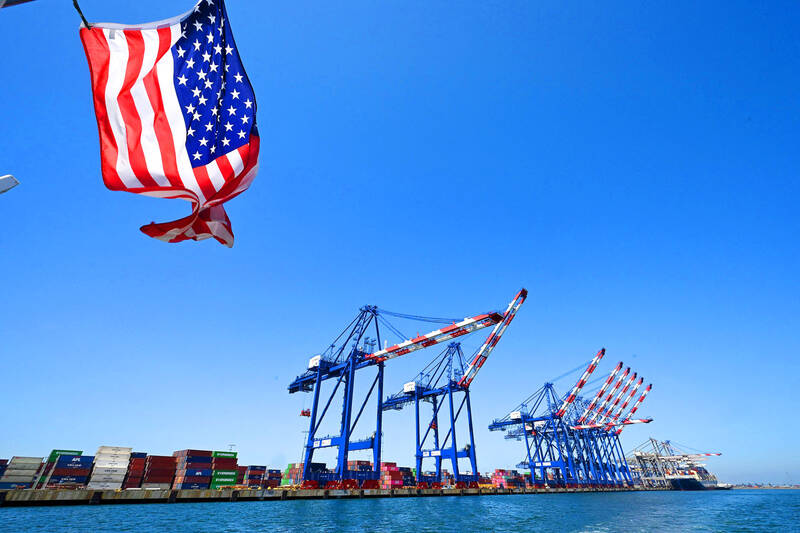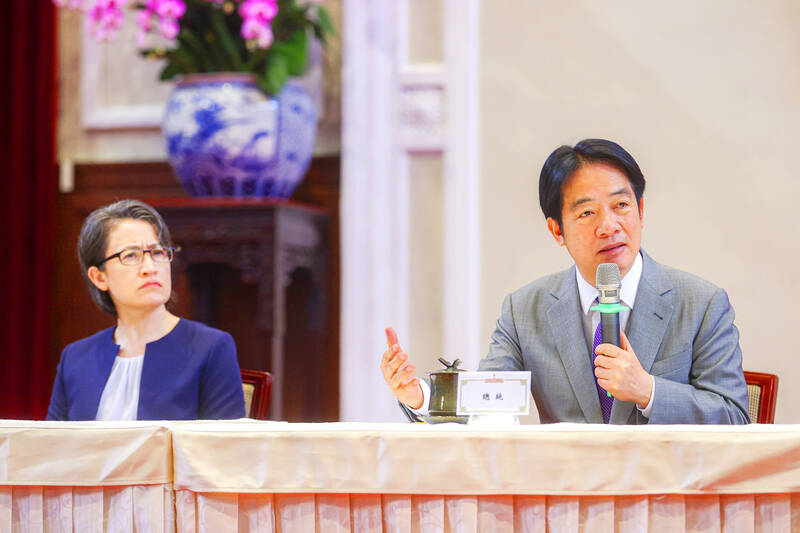The new 20 percent tariff rate the US set on goods from Taiwan is “temporary,” and the government expects to negotiate a lower figure, President William Lai (賴清德) said yesterday.
Tariff rates on semiconductors, electronics, and information and communications technology products are to be determined separately under forthcoming US sectoral measures.
The rate set by the US was one of several so-called “reciprocal” tariffs imposed by US President Donald Trump, just hours before a deadline to finalize trade frameworks with his administration.

Photo: AFP
Although lower than the 32 percent tariff initially proposed for Taiwan in April, the new 20 percent rate still exceeds those granted to regional competitors, such as Japan and South Korea, which face only a 15 percent levy.
The tariff was formalized in an executive order signed by Trump and is set to take effect on Thursday next week.
While key Taiwanese exports — such as semiconductors — are largely exempt, the effective average tariff on shipments from Taiwan would rise to 8.3 percent from 5.8 percent, said Bumki Son, an economist at Barclays Bank.

Photo: CNA
“The 20 percent tariff rate was never Taiwan’s target to begin with. We will continue negotiations and strive for a rate that is more favorable for Taiwan,” Lai told a news briefing.
Trade talks between the US and Taiwan are continuing, a US official confirmed yesterday, adding that a final agreement is close.
“The interim rate is lower than the original rate, and it’s much lower than that of several other major trading partners with ongoing negotiations,” said the official, who spoke on condition of anonymity.
Taiwan’s offer was well received, and the two sides are close to a final agreement, the official added.
Taiwan is also awaiting the outcome of a US investigation under Section 232 of the Trade Expansion Act, which includes probes into sectors such as semiconductor products — a cornerstone of Taiwan’s exports that remains exempt from the newly imposed tariffs.
“Taiwan and the US will continue negotiations, with upcoming discussions to also include supply chain cooperation and issues related to Section 232 investigation,” the Executive Yuan said. “If an agreement is reached, there is a possibility of further reducing reciprocal tariff rates and securing preferential treatment on tariffs related to the Section 232 investigation.”
The final tariff rates would inevitably impact Taiwanese industry, Lai said.
He praised Premier Cho Jung-tai (卓榮泰) and the Executive Yuan for proposing the Special Act for Strengthening Economic, Social and National Security Resilience in Response to International Circumstances (因應國際情勢強化經濟社會及國土安全韌性特別條例) in April, which ultimately earmarked NT$930 billion (US$30.97 billion) in relief funds.
Lai urged the Cabinet and the Legislative Yuan to implement the proposal without delay to support small and medium-sized enterprises as they face growing pressure from the new tariffs.
Countries engaging in tariff talks with the US have signed a confidentiality agreement, which is why the government is not allowed to publicize negotiation details before the talks are concluded, Lai said in response to opposition parties’ accusations of “keeping the public in the dark.”
The government would publish news concerning the joint statement once the result is finalized, he said.
Taiwan recorded a trade surplus of about US$65 billion with the US last year, driven by strong US demand for Taiwanese technology products amid the artificial intelligence boom.
That trade imbalance was likely to rankle Trump, who has pledged to reshape US trade relationships.
Taiwan’s exports to the US last month surged to a record US$17.3 billion, as firms rushed to ship goods ahead of the new tariffs taking effect.
Similarly strong exports have propelled Taiwan’s economy, although analysts have warned that growth could taper over the rest of this year — partly due to worries about the Trump duties.
The effect of the tariffs on Taiwan might be more severe than their rates alone would suggest, given that the New Taiwan dollar has gained about 11 percent against the US dollar this year.
While the government has repeatedly denied speculation that the appreciation was part of concessions made to the US during negotiations, a much stronger exchange rate has taken a toll on many Taiwanese exporters.
Taipei had signaled it would step up its procurement of US goods, including energy, agricultural products and military equipment, to help alleviate the trade imbalance.
Taiwan had also pledged to bolster investment in the US and close export control loopholes for high-tech products that have long been a concern for Washington as it tries to curb China’s innovation due to fears it would provide a military edge.
Additional reporting by Chen Cheng-yu

The Taiwanese passport ranked 33rd in a global listing of passports by convenience this month, rising three places from last month’s ranking, but matching its position in January last year. The Henley Passport Index, an international ranking of passports by the number of designations its holder can travel to without a visa, showed that the Taiwan passport enables holders to travel to 139 countries and territories without a visa. Singapore’s passport was ranked the most powerful with visa-free access to 192 destinations out of 227, according to the index published on Tuesday by UK-based migration investment consultancy firm Henley and Partners. Japan’s and

NATIONAL SECURITY THREAT: An official said that Guan Guan’s comments had gone beyond the threshold of free speech, as she advocated for the destruction of the ROC China-born media influencer Guan Guan’s (關關) residency permit has been revoked for repeatedly posting pro-China content that threatens national security, the National Immigration Agency said yesterday. Guan Guan has said many controversial things in her videos posted to Douyin (抖音), including “the red flag will soon be painted all over Taiwan” and “Taiwan is an inseparable part of China,” while expressing hope for expedited “reunification.” The agency received multiple reports alleging that Guan Guan had advocated for armed reunification last year. After investigating, the agency last month issued a notice requiring her to appear and account for her actions. Guan Guan appeared as required,

Japan and the Philippines yesterday signed a defense pact that would allow the tax-free provision of ammunition, fuel, food and other necessities when their forces stage joint training to boost deterrence against China’s growing aggression in the region and to bolster their preparation for natural disasters. Japan has faced increasing political, trade and security tensions with China, which was angered by Japanese Prime Minister Sanae Takaichi’s remark that a Chinese attack on Taiwan would be a survival-threatening situation for Japan, triggering a military response. Japan and the Philippines have also had separate territorial conflicts with Beijing in the East and South China

A strong cold air mass is expected to arrive tonight, bringing a change in weather and a drop in temperature, the Central Weather Administration (CWA) said. The coldest time would be early on Thursday morning, with temperatures in some areas dipping as low as 8°C, it said. Daytime highs yesterday were 22°C to 24°C in northern and eastern Taiwan, and about 25°C to 28°C in the central and southern regions, it said. However, nighttime lows would dip to about 15°C to 16°C in central and northern Taiwan as well as the northeast, and 17°C to 19°C elsewhere, it said. Tropical Storm Nokaen, currently